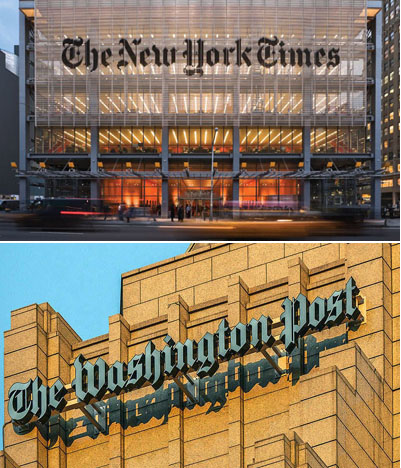Analysis by WorldTribune Staff, March 26, 2019
When Olympic athletes who win gold, silver or bronze medals are caught violating the regulations of the Games, they must return their medals to the International Olympic Committee. In Olympics history, 143 medals have been stripped.
When a media outlet is awarded a Pulitzer Prize for reporting as fact something that isn’t, should it return the Pulitzer?
 In 2018, the New York Times and Washington Post shared the Pulitzer Prize for their national reporting of President Donald Trump’s alleged collusion with Russia. They were awarded $15,000 in a joint prize.
In 2018, the New York Times and Washington Post shared the Pulitzer Prize for their national reporting of President Donald Trump’s alleged collusion with Russia. They were awarded $15,000 in a joint prize.
They received the award, the Pulitzer board said, “For deeply sourced, relentlessly reported coverage in the public interest that dramatically furthered the nation’s understanding of Russian interference in the 2016 presidential election and its connections to the Trump campaign, the President-elect’s transition team and his eventual administration.”
“Deeply sourced? Hardly. Relentlessly reported? Definitely,” Beth Baumann noted in a March 25 op-ed for Townhall.
A Pulitzer has never been revoked.
Robert Morton, President of FreePressFoundation.org, said the future of American journalism is hanging in the balance.
“Either these awards should be rescinded or the New York Times and the Washington Post should uphold the highest traditions of the American Free Press and voluntarily surrender them,” he said.
In 2003, Pulitzer considered rescinding the 1932 award to infamous New York Times’ Moscow correspondent Walter Duranty, who was an apologist for one of history’s bloodiest tyrants, Joseph Stalin.
After six months of consideration, the Pulitzer board decided not to rescind Duranty’s prize, explaining at the time that “A Pulitzer Prize for reporting is awarded not for the author’s body of work or for the author’s character but for the specific pieces entered in the competition.”
The 2018 award winning journalists reporting on Trump-Russia “collusion” were Maggie Haberman, Jo Becker, Matt Apuzzo and Mark Mazetti from the Times and Rosalind Helderman, Tom Hamburger, Ellen Nakashima, Adam Entous and Greg Miller from the Post.
Neither the Times’ or Post’s Pulitzer winning reporting was “heavily sourced,” although it was “relentlessly reported,” “probably because they were trying to push their editorial agenda,” Baumann wrote. “And, of course, CNN and MSNBC and every other liberal talking head out there decided to run with this ‘solid reporting’ job both news organizations conducted.”
Writing for the New York Post in a column titled “The New York Times owes Americans a big, fat apology”, Michael Goodwin noted that “The Times was way out front, along with the Washington Post, in peddling the Russia collusion hoax. And because of its prominence and the power of its news service, the vast bulk of the media followed the Times’ lead. It is the bell cow, and it led the media over the cliff by getting the big story wrong.”
Three days after President Donald Trump’s 2016 election victory, then publisher Arthur Sulzberger Jr. and editor Dean Baquet wrote in a letter to NYT subscribers that the newspaper staff vowed to “rededicate ourselves to the fundamental mission of Times journalism. That is to report America and the world honestly, without fear or favor.”
Then came Russia collusion, and, as baseball legend Yogi Berra once said, “it’s deja vu all over again.”
The Times didn’t keep its promise to report “without fear or favor,” Goodwin noted, and now, “the paper is facing a new storm of criticism. This time, of course, the topic is RussiaGate. And once again, the Times is accused of accepting and spreading fake news, and of missing the truth.”
“And not just one or two or even three times, but for more than two years, the paper of record acted like a prosecutor making the case that Trump was at least compromised by Russia, and maybe even conspired with Vladimir Putin to steal the election,” Goodwin wrote.
For the Times, nothing has changed since 2016, Goodwin noted, “And in both cases, the results were the same: The Times missed the story. Just as reporters and editors believed Trump couldn’t win in 2016 because they didn’t want him to, they believed the Russia collusion story because they wanted it to be true.”
Daily Wire columnist Ashe Schow noted that “We know there will be no reckoning among members of the media for their contributions to the narrative that Trump would be indicted or impeached following the allegedly obvious evidence that he and his 2016 campaign colluded with Russia to steal the election from Hillary Clinton. Those media outlets that did follow the narrative were richly rewarded.”
On the other hand, Schow wrote, “those – like Chuck Ross of The Daily Caller, Mollie Hemingway of The Federalist, Andrew McCarthy of National Review, and others – who reported that the collusion narrative was a bust and have now been proven correct, received only scorn and judgment.”
Your Intel Brief: Geostrategy-Direct __________ Fix The Media Now
